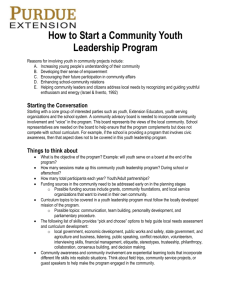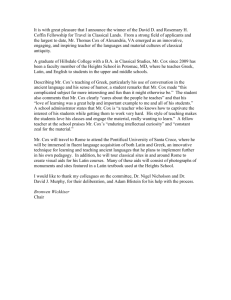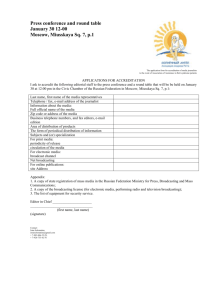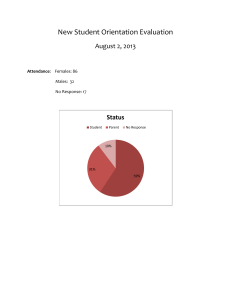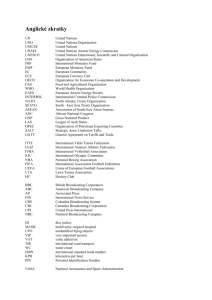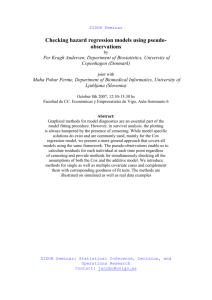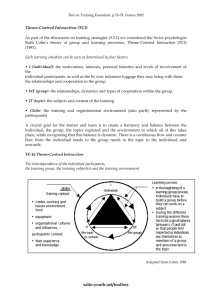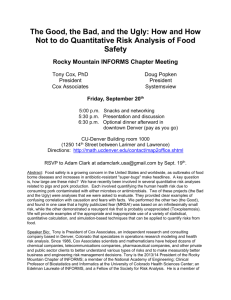document - Brandon Howell
advertisement
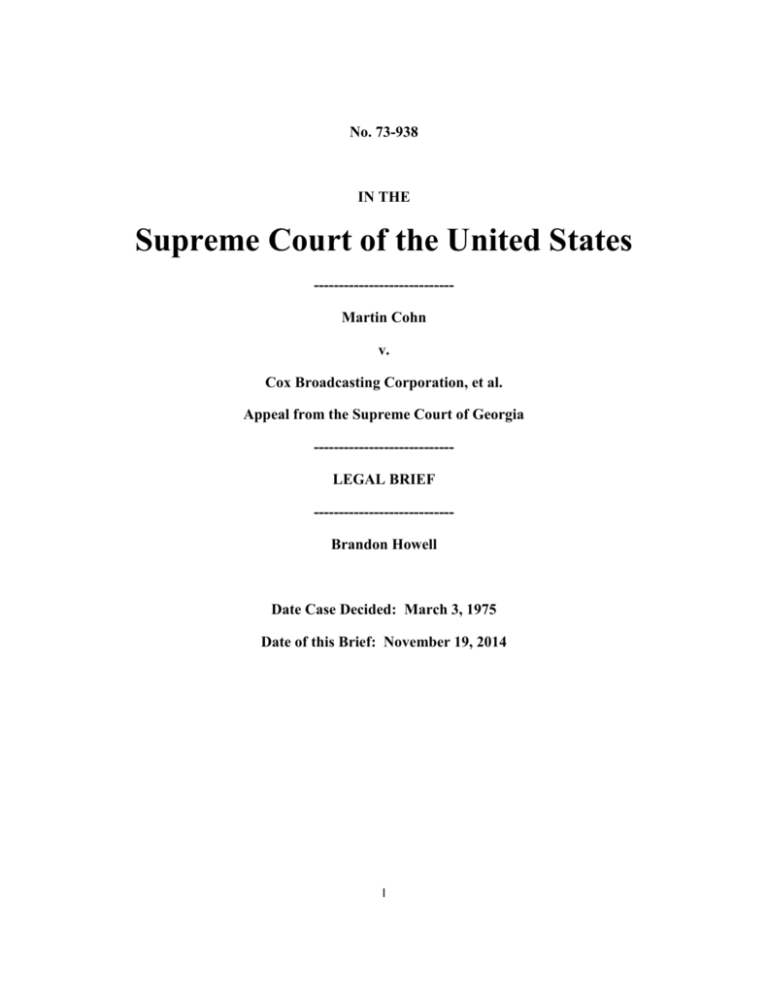
No. 73-938 IN THE Supreme Court of the United States ---------------------------Martin Cohn v. Cox Broadcasting Corporation, et al. Appeal from the Supreme Court of Georgia ---------------------------LEGAL BRIEF ---------------------------Brandon Howell Date Case Decided: March 3, 1975 Date of this Brief: November 19, 2014 I II TABLE OF CONTENTS Facts of the Case.......................................................................... IV The Supreme Court Decision ....................................................... V History of the Case ...................................................................... VI Issues ......................................................................................... VIII The Majority Opinion................................................................. IX Other Opinions. ............................................................................. X Conclusion ................................................................................ XIII III FACTS OF THE CASE A 17-year-old girl from Sandy Springs, Georgia was a victim of rape and did not survive the attack in August 1971. Her father, Martin Cohn, filed an invasion of privacy suit against Cox Broadcasting Corporation when a reporter broadcast her name1. The suit was based on Ga. Code Ann Section: 26-9901 which made it a crime to publish or broadcast the name or identity of a rape victim2. A reporter had obtained the victim’s name from the indictments which were public records available for inspection3. The trial court rejected the claims by Cox Broadcasting Corporation that the broadcast was privileged under the First and Fourteenth Amendments and ruled in favor of Cohn4. Although lawyers for Cox Broadcasting Corporation appealed the decision, the Georgia Supreme Court upheld the lower court’s decision5. This resulted in Cox Broadcasting Corporation challenging the law and petitioning the U.S. Supreme Court to review the legality of the Georgia statute6. 1 Cox Broadcasting Corp. v. Cohn | Casebriefs. (n.d.). Retrieved from http://www.casebriefs.com/blog/law/torts/torts-keyed-to-epstein/privacy/ cox-broadcasting-corp-v-cohn-2/ 2 Id. 3 Tedford, T., & Herbeck, D. (2009, January 1). Cox Broadcasting Corp. v. Cohn (1975). Retrieved from http://www.bc.edu/bc_org/avp/cas/comm/free_speech/cox.html 4 Id. 5 Cox Broadcasting Corp. v. Cohn - The Circumstances. (n.d.). Retrieved from http://law.jrank.org/pages/23272/Cox-Broadcasting-Corp-v-Cohn-Circumstances.html 6 Id. IV THE SUPREME COURT DECISION 8 of Justices in the Majority 8 of Justices Concurring Warren E. Burger William O. Douglas William J. Brennan, Jr. Potter Stewart Byron R. White Thurgood Marshall Harry A. Blackmun Lewis F. Powell, Jr. 1 of Justices Dissenting William H. Rehnquist Author of the Majority Opinion Byron R. White Authors of the Other Opinions William O. Douglas Lewis F. Powell, Jr. William H. Rehnquist V HISTORY OF THE CASE The appellee, Martin Cohn, filed suit against a WSB-TV and its owner, Cox Broadcasting Corporation (appellant), after one of their reporters, Thomas Wassell, broadcast the name of his 17-year-old daughter who died after being a victim of rape. The victim had been at a party where alcohol was served. An autopsy revealed that she had choked on her own vomit but also had been raped7. Six teens that were at the party were charged several months later with rape8. In April 1972, five pleaded guilty and one not guilty9. It was during that day that Wassell learned the name of the victim by being granted the ability to exam the indictments in the courtroom. Those indictments were public records10. Martin Cohn, appellee, filed suit in May 1972 asking for monetary damages against the appellants stating that his right to privacy had been invaded by the television station broadcasting his daughter’s name11. The appellants acknowledged the broadcast but claimed they were privileged under both state law and the First and Fourteenth Amendments12. The trial court stood by the Georgia statute stating that it gave civil remedy to those injured by its violation and granted summary judgment to Cohn13. Lawyers for Cox Broadcasting Corporation appealed the decision; however, the Supreme Court of Georgia held that the trial court had erred in allowing the Georgia statute to give a civil cause of 7 Spurlock, J. (n.d.). The Effects of the Cox Broadcasting Corp. v. Cohn Decision: Almost Four Decades Later. Retrieved from http://commlawreview.org/Archives/v14i1/ CLR_Cox_Broadcasting.pdf 8 Id. 9 Tedford, T., & Herbeck, D. (2009, January 1). Cox Broadcasting Corp. v. Cohn (1975). Retrieved from http://www.bc.edu/bc_org/avp/cas/comm/free_speech/cox.html 10 Id. 11 Id. 12 Id. 13 Id. VI action and therefore did not consider the constitutionality of the statute14. The end result was that the court found that the identity of the rape victim did not rise to the level of public interest that would afford the appellant constitutional protection15. After their failed appeal, Cox Broadcasting Corporation filed suit challenging the law. It petitioned the U. S. Supreme Court to review the legality of the Georgia statute16. Does a state law, that prohibits the publication of the name of a rape victim (even if it is publicly revealed information) an invasion of privacy, violate the First and or Fourteenth Amendment17. Justice Byron R. White wrote the majority opinion which was an 8-1 vote. The Supreme Court reasoned that the name of the rape victim was obtained by proper means, and that a crime committed and the prosecution of that crime is of public concern. Therefore, the appellant is protected by the First Amendment freedom of the press in its reporting of the matter18. The U.S. Supreme Court overturned the ruling of the Georgia Supreme Court. 14 Cox Broadcasting Corp. v. Cohn | Casebriefs. (n.d.). Retrieved from http://www.casebriefs.com/blog/law/torts/torts-keyed-to-epstein/privacy/coxbroadcasting-corp-v-cohn-2/ 15 Id. 16 Cox Broadcasting Corp. v. Cohn - The Circumstances. (n.d.). Retrieved from http://law.jrank.org/pages/23272/Cox-Broadcasting-Corp-v-Cohn-Circumstances.html 17 Harrington, S. (2013, December 9). Cox v. Cohn: A case brief. Retrieved from http://samharrington.net/cox-v-cohn-a-case-brief/ 18 Cox Broadcasting Corp. v. Cohn | Casebriefs. (n.d.). Retrieved from http://www.casebriefs.com/blog/law/torts/torts-keyed-to-epstein/privacy/coxbroadcasting-corp-v-cohn-2/ VII ISSUES OR QUESTIONS One issue was whether a criminal statute regarding the reporting of the identity of the victim of a crime precludes a media defendant from reporting on that issue when it is of public concern19. The issue presented to the U. S. Supreme Court was whether a State may extend a cause of action for damages for invasion of privacy caused by the publication of the name of a deceased rape victim which was publicly revealed in connection with the prosecution of the crime consistently with the First and Fourteenth Amendments20. Lastly, Justice Rehnquist wrote a dissenting opinion. The issue that he had was that the Supreme Court of Georgia did not give a “final judgment or decree”. He felt that his court should send the case back to them for more “jurisdiction”21. 19 Cox Broadcasting Corp. v. Cohn | Casebriefs. (n.d.). Retrieved from http://www.casebriefs.com/blog/law/torts/torts-keyed-to-epstein/privacy/coxbroadcasting-corp-v-cohn-2/ 20 Tedford, T., & Herbeck, D. (2009, January 1). Cox Broadcasting Corp. v. Cohn (1975). Retrieved from http://www.bc.edu/bc_org/avp/cas/comm/free_speech/cox.html 21 Harrington, S. (2013, December 9). Cox v. Cohn: A case brief. Retrieved from http://samharrington.net/cox-v-cohn-a-case-brief/ VIII THE MAJORITY OPINION The ratio decidendi of the Supreme Court was that the Georgia statute violated the Constitution. The case was argued on November 11, 1974. An 8-1 vote in favor of Cox Broadcasting Corporation was decided on March 3, 1975. Justice Byron White delivered the opinion of the Court stating, “This right of the press, to publicize public information was of critical importance to America, because it allows American citizens to be aware of and make judgments on public business”22. Justice White stated, “Restricting the media as the Georgia law did was a dangerous encroachment on press freedom as it ‘would invite timidity and selfcensorship’”23. According to White, “The news media is an important resource for citizens which allow them to scrutinize government proceedings. The commissions and adjudication of crimes are issues relevant to public interest”24. Justice White also noted that “in the development of the privacy right, the Court has held that the interests of privacy ‘fade’ in cases where controversial ‘information already appears on the public record’”25. 22 Harrington, S. (2013, December 9). Cox v. Cohn: A case brief. Retrieved from http://samharrington.net/cox-v-cohn-a-case-brief/ 23 Id. 24 COX BROADCASTING CORPORATION v. COHN. (n.d.). Retrieved from http://www.oyez.org/cases/1970-1979/1974/1974_73_938#mla 25 Id. IX OTHER OPINIONS Justice Lewis F. Powell, Jr. concurred with the majority; however, he wrote a regular concurrence to state his opinion. Powell agrees with “the Court’s determination that the First Amendment proscribes imposition of civil liability in a privacy action predicated on the truthful publication of matter contained in open judicial records.26” His opinion differs from the Court’s regarding the “role of truth in defamation actions brought by private citizens.27” Powell stated, “the Court identifies as an ‘open’ question the issue of ‘whether the First and Fourteenth Amendments require that truth be recognized as a defense in a defamation action brought by a private person as distinguished from a public official or a public figure’.28” Justice Powell concluded that a more recent case “Gertz v. Welch, 418 U. S. 323 (1974), largely resolves that issue.29” In a written special concurrence, Justice William O. Douglas agrees “that the state judgment is final” and “agrees with the reversal of the Georgia court.30” He referred to the New Jersey State Lottery Comm’n v. United States, 491 F.2d 219 (CA3 1974) case stating that “for the reasons I stated in my dissent from our disposition of that case, there is no power on the part of government to suppress or penalize the publication of ‘news of the day’.31” 26 Tedford, T., & Herbeck, D. (2009, January 1). Cox Broadcasting Corp. v. Cohn (1975). Retrieved from http://www.bc.edu/bc_org/avp/cas/comm/free_speech/cox.html 27 Id. 28 Id. 29 Id. 30 Cox Broadcasting Corp. V. Cohn (1974). (n.d.). Retrieved from http://supremecourtopinions.wustl.http://supremecourtopinions.wustl.edu/ index.php?rt=pdfarchive/details/1146edu/files/opinion_pdfs/1974/73-938.pdf 31 Id. X One Justice wrote a jurisdictional dissent. It was Justice William H. Rehnquist. He wrote that his opinion was that “the decision which is the subject of this appeal is not a ‘final’ judgment or decree, as that term is used in 28 U. S. C. § 1257, I would dismiss this appeal for want of jurisdiction.32” This was his basis for dissent. 32 Cox Broadcasting Corp. V. Cohn (1974). (n.d.). Retrieved from http://supremecourtopinions.wustl.http://supremecourtopinions.wustl.edu/ index.php?rt=pdfarchive/details/1146edu/files/opinion_pdfs/1974/73-938.pdf XI XII CONCLUSION The Georgia statute is well intentioned in protecting the victim. However, in the case of Cohn v. Cox Broadcasting, it was a high profile case demanding media attention. It was not until several months after the crime and death of the victim that her name became part of the public record. When the reporter asked to review the records, they were freely provided to him without any removal of the victim’s name. Cohn had filed suit based on invasion of privacy. Although the trial court and Georgia Supreme Court upheld the Georgia statute in regards to Martin Cohn’s case, the U. S. Supreme Court reversed the decision based on the fact that the victim’s name was obtained by proper legal means and was a case of public interest. In this particular case, the Appellant was protected by the First Amendment freedom of the press in the reporting of this crime. Respectfully submitted, Brandon Howell XIII XIV
